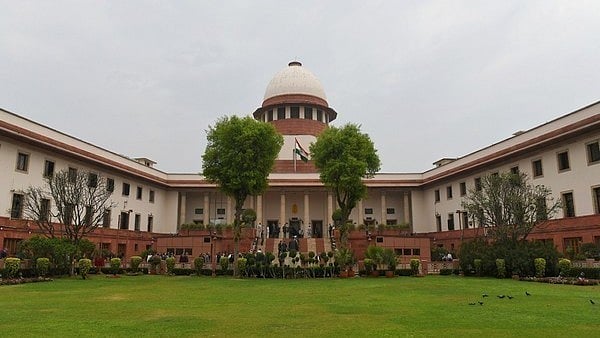
The Supreme Court of India.
Credit: PTI Photo
New Delhi: The Supreme Court on Wednesday said the law aids only the law-abiding citizens and certainly not its resistants and if the Rule of Law is to prevail in the society, every person would have to abide by the law, respect the law and follow the due process of law.
A bench of Justices Bela M Trivedi and Prasanna B Varale took an exception to high court's March 29 and April 20, 2023 orders granting anticipatory bail to a group of accused, despite issuance of proclamation orders and repeated non bailable warrants against them in a complaint filed by Serious Fraud Investigation Office in 2019 in a Special Court, Gurugram.
A few accused including Akshat Singh, represented by senior advocate Sidharth Luthra and advocate Chetanya Singh, however, got the relief, as proclamation orders in their cases were quashed.
The complaint was related to one Adarsh Credit Cooperative Society Limited (ACCSL) which was a multi-state credit cooperative society, founded by one Mukesh Modi, and was managed and controlled by him and his family and his associates.
The said society accepted the deposits from its members, who were mostly low to middle income individuals. The ACCSL had 800+ branches, 20 lakhs members, 3.7 lakhs advisors and Rs 9253 crores of outstanding deposits as on May 31, 2018.
The controllers of the Society i.e. Mukesh Modi, Rahul Modi and others got incorporated around 125 companies (Adarsh Group of Companies). On the completion of the investigation, it was found that the funds to the tune of Rs 1700 crores were given by the ACCSL as illegal loans to its own controlled 70 Adarsh Group of Companies (CUIs). It was further alleged that total amount of Rs 4120 crores were the outstanding balance as on March 31, 2018 against such illegal loans given by the ACCSL.
Examining SFIO's plea against the relief to the accused, the court emphasised that it cannot be gainsaid that the judicial time of every court, even of Magistrate’s court is as precious and valuable as that of the high courts and the Supreme Court and the accused are duty bound to cooperate the trial courts in proceeding further with the cases and bound to remain present in the court as and when required.
"Not allowing the courts to proceed further with the cases by avoiding execution of summons or warrants, disobeying the orders of the court, and trying to delay the proceedings by hook or crook, would certainly amount to interfering with and causing obstruction in the administration of justice," the bench said.
Referring to Srikant Upadhay’s case (2024), the bench said it has been held when a warrant of arrest is issued or proclamation proceedings are initiated, the accused would not be entitled to invoke, except in exceptional cases, the extraordinary power of the court to grant anticipatory bail.
"Granting anticipatory bail is certainly not the rule. The respondent accused, who have continuously avoided to follow the due process of law, by avoiding attendance in the court, by concealing themselves and thereby attempting to derail the proceedings, would not be entitled to the anticipatory bail," the bench said.
The court said, it is no more res integra that economic offences constitute a class apart, as they have deep rooted conspiracies involving huge loss of public funds, and therefore such offences need to be viewed seriously. They are considered as grave and serious offences affecting the economy of the country as a whole and thereby posing serious threats to the financial health of the country.
"When after the investigation, a chargesheet is submitted in the court, or in a complaint case, summons or warrant is issued to the accused, he is bound to submit himself to the authority of law. If he is creating hindrances in the execution of warrants or is concealing himself and does not submit to the authority of law, he must not be granted the privilege of anticipatory bail, particularly when the court taking cognizance has found him prima facie involved in serious economic offences or heinous offences," the court said.
In the present case, the bench said though the Special Court had taken cognizance of the alleged offences under the Companies Act, including under Section 447 and other offences under the IPC, and even though the non-bailable warrants were issued from time to time against the respondents, and even though the proclamation proceedings were initiated against them, the high court has passed the orders.
"The said orders have been passed in utter disregard of the mandatory conditions contained in Section 212(6) of the Companies Act, and also ignoring the conduct of the respondent accused. Such orders being in the teeth of the legal position settled by this Court, as also in the teeth of the Section 212(6) of Companies Act, would fall into the category of perverse orders and therefore untenable at law," the court held.
In none of the orders, the bench said, the high court has bothered to look into the proceedings conducted, and the detailed orders passed by the Special Court for securing the presence of the respondents – accused.
The court also emphasised there cannot be a strait jacket formula, as sought to be submitted by the advocates for the respondents that the court must first issue a summons even in case of a warrant case, irrespective of the gravity or seriousness of the offence.
